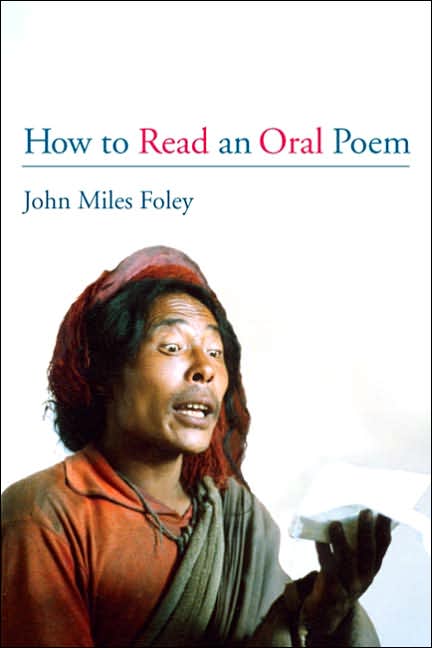 How to Read an Oral Poem. Urbana: University of Illinois Press. (eCompanion available at http:// oraltradition.org/hrop) The first “word,” then, seeks to answer the question “What is oral poetry?” by breaking down the oral/written dichotomy itself and by investigating common structuring techniques for four different categories of verbal art: “oral performance,” “voiced texts,” “voices from the past,” and “written oral poems” (39)—labels that designate the poetry according to its oral/aural or written nature with regard to composition, performance, and reception. “The Second Word” continues by using these categories to explore the importance of context (performance-based or otherwise) in interpreting such works of art, which in turn entails a reevaluation of what it means to “read” oral poetry, with the appropriate goal being to decode the signs provided by the poet in light of their context- and tradition-enhanced meanings. The next few sections of the volume then provide a theoretical framework for interpreting these oral poems, with discussions of performance theory (and especially Bauman’s “keys to performance”), ethnopoetics (with specific application to slam poetry and Beowulf), and immanent art (involving questions of structure and word-power). These theoretical discussions are then followed by an “almanac” of 710 R. SCOTT GARNER homemade proverbs that, when kept in mind, can guide a reader toward more faithful interpretation of oral poetry: 1) Oral poetry works like language, only more so; 2) Oralpoetry is a very plural noun, 3) Performance is the enabling event, tradition is the context for that event; 4) The art of oral poetry emerges through rather than in spite of its special language; 5) The best companion for reading oral poetry is an unpublished dictionary; 6) The play’s the thing (and not the script); 7) Repetition is the symptom, not the disease; 8) Composition and reception are two sides of the same coin; 9) Read behind and between the signs; and 10) True diversity demands diversity in frame of reference. The next two “words” provide direct application of the previously developed theoretical framework to the poems themselves. First, “Reading Some Oral Poems” demonstrates the usefulness of these approaches through investigation of Zuni telapnaawe, Guatemalan stories surrounding Hermano Pedro, contemporary slam poetry, the Odyssey, the Siri Epic from India, and the Medieval French Song of Roland. Then, the “Eighth Word” focuses on South Slavic poetry and discusses the necessity of understanding and reading these poems on their own terms as various genres that collectively make up a thriving and widely diverse ecological system of poetry and performance. Finally, a short (and cleverly titled) Post-Script concludes the volume by discussing briefly the similarities between oral poetry and the Internet as well as the potential for new technologies to better capture and understand those oral performances Meant as an introduction for non-specialists to the contexts, plurality, and—above all—interpretation of oral poetry, the volume begins by providing four scenarios (involving a Tibetan paper-singer, a North American slam poet, a South African praise-poet, and an ancient Greek bard) that demonstrate the widely divergent possibilities that exist for oral poetry. The next section (“What the Oral Poets Say [in Their Own ‘Words’]”) then narrows the focus to what the South Slavic guslari have to say about reči (“words”), thereby moving readers away from a preconceived literate and textual understanding of words as fixed items printed on a page and thus toward a conception of a “word” as a flexible unit of utterance that varies in size and form according to its functional role in the communicative process. (责任编辑:admin) |
